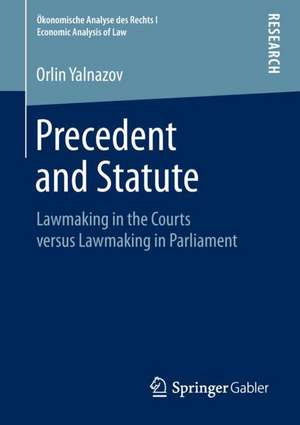Precedent and Statute: Lawmaking in the Courts versus Lawmaking in Parliament: Ökonomische Analyse des Rechts | Economic Analysis of Law
Autor Orlin Yalnazoven Limba Engleză Paperback – 13 noi 2018
Preț: 727.18 lei
Preț vechi: 886.80 lei
-18% Nou
Puncte Express: 1091
Preț estimativ în valută:
139.19€ • 146.23$ • 116.98£
139.19€ • 146.23$ • 116.98£
Carte tipărită la comandă
Livrare economică 12-26 martie
Preluare comenzi: 021 569.72.76
Specificații
ISBN-13: 9783658243845
ISBN-10: 3658243848
Pagini: 345
Ilustrații: XI, 345 p. 7 illus.
Dimensiuni: 148 x 210 mm
Greutate: 0.43 kg
Ediția:1st ed. 2018
Editura: Springer Fachmedien Wiesbaden
Colecția Springer Gabler
Seria Ökonomische Analyse des Rechts | Economic Analysis of Law
Locul publicării:Wiesbaden, Germany
ISBN-10: 3658243848
Pagini: 345
Ilustrații: XI, 345 p. 7 illus.
Dimensiuni: 148 x 210 mm
Greutate: 0.43 kg
Ediția:1st ed. 2018
Editura: Springer Fachmedien Wiesbaden
Colecția Springer Gabler
Seria Ökonomische Analyse des Rechts | Economic Analysis of Law
Locul publicării:Wiesbaden, Germany
Cuprins
Two Types of Legal Uncertainty.- Economics of the Fact-Law Distinction.- Fact, Law, and Legal Change.- Remoteness in Contract.- Metarules versus Metastandards.- Precedent in the Civil and Common Law.
Recenzii
“Precedent and Statute shows that cross-pollination is possible and, more importantly, that it is worthwhile. … it breaks new ground in the comparative study of legal systems.” (Alberto Quintavalla, The Modern Law Review, Vol. 82 (5), 2019)
Notă biografică
Orlin Yalnazov was born in Varna. He holds a PhD in Law & Economics, awarded jointly by Erasmus Universiteit Rotterdam, Universität Hamburg, and Universitá di Bologna, as well as an LLM from the University of Cambridge and an LLB from Durham University. He works at the University of Hull.
Textul de pe ultima copertă
Should laws be made in courts or in parliaments? Orlin Yalnazov proposes a new approach to the problem. He conceptualizes law as an information product, and law-making as an exercise in production. Law-making has inputs and outputs, and technology is used to transform one into the other. Law may, depending on input and technology, take on different forms: it can be vague or it can be certain. The ‘technologies’ between which we may choose are precedent and statute. Differences between the two being sizeable, our choice has significant repercussions for the cost of the input and the form of the output. The author applies this framework to several problems, including the comparison between the common and the civil law, comparative civil procedure, and EU law. Perhaps most critically, he offers a critique of the ‘efficiency of the common law’ hypothesis.
Contents
Researchers, students, and practitioners in the fields of law, economics, and legal philosophy
The Author
Orlin Yalnazov was born in Varna. He holds a PhD in Law & Economics, awarded jointly by Erasmus Universiteit Rotterdam, Universität Hamburg, and Universitá di Bologna, as well as an LLM from the University of Cambridge and an LLB from Durham University. He works at the University of Hull.
Contents
- Two Types of Legal Uncertainty
- Economics of the Fact-Law Distinction
- Fact, Law, and Legal Change
- Remoteness in Contract
- Metarules versus Metastandards
- Precedent in the Civil and Common Law
Researchers, students, and practitioners in the fields of law, economics, and legal philosophy
The Author
Orlin Yalnazov was born in Varna. He holds a PhD in Law & Economics, awarded jointly by Erasmus Universiteit Rotterdam, Universität Hamburg, and Universitá di Bologna, as well as an LLM from the University of Cambridge and an LLB from Durham University. He works at the University of Hull.
Caracteristici
A legal theoretical critique of the efficiency of the common law hypothesis.





